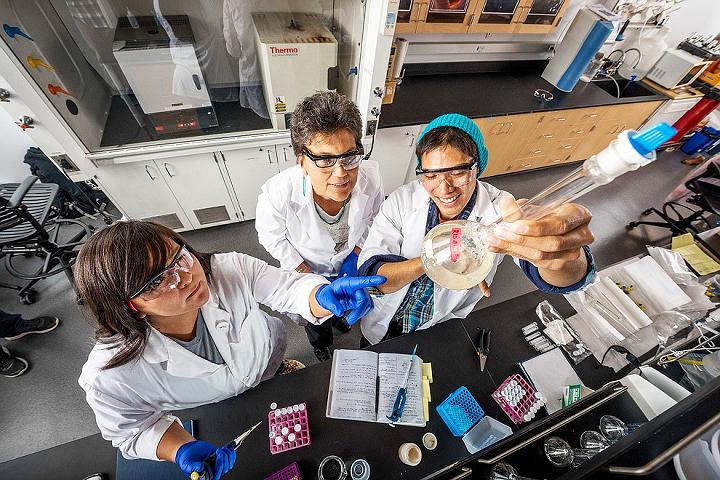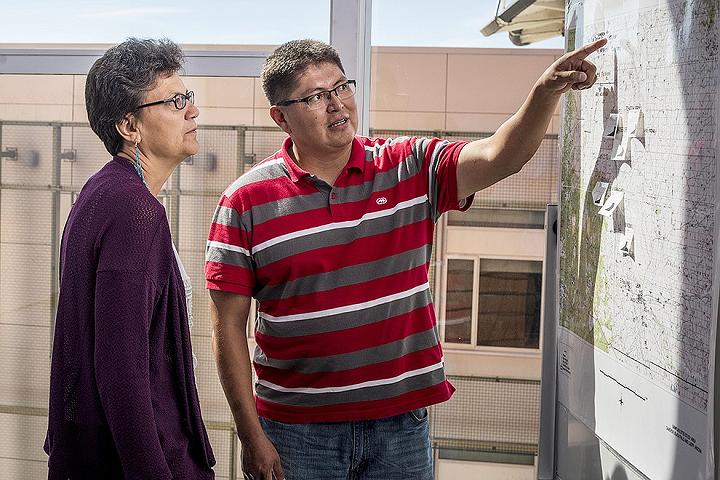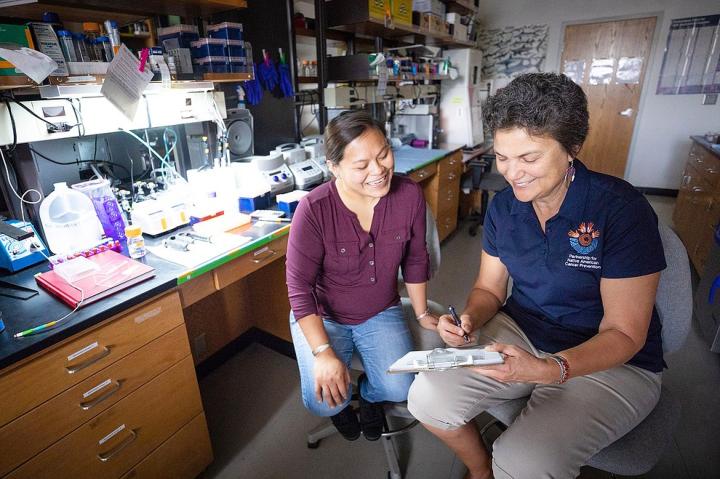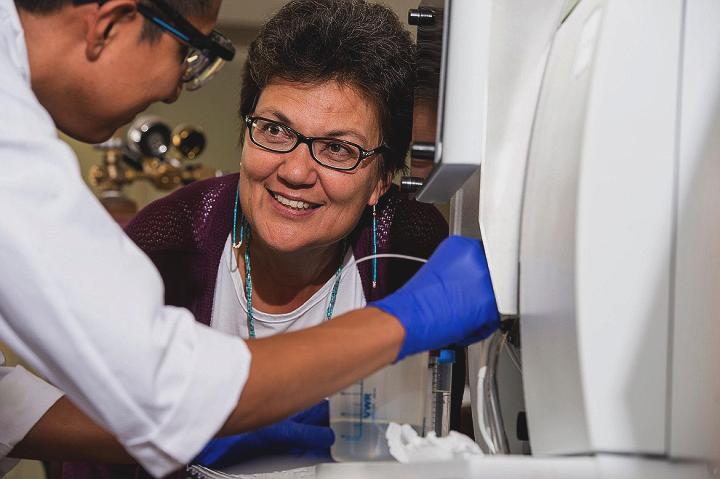 |
Canku Ota
|
 |
|
(Many Paths)
|
||
|
An Online Newsletter
Celebrating Native America
|
||
|
July 2021 - Volume 19
Number 7
|
||
|
|
||
|
NAU Professor Inspires
Students While Advancing Cancer Research
|
||
|
by Stan Bindell, for
the Navajo-Hopi Observer
|
||
FLAGSTAFF, AZ – Dr. Jani Ingram, regents professor and environmental chemist at Northern Arizona University, is working on cancer research while training Native students through Partnership for Native American Cancer Prevention. The program is funded by the National Cancer Institute and has multiple partners, including the University of Arizona. While there are similar programs throughout the U.S., this one is unique because it serves Native Americans in Arizona and the Southwest. According to Ingram, research has shown disparities between Native Americans and other communities. Additionally, the NAU program partners with tribal communities on cancer research projects. “We look at the concerns they bring to us,” said Ingram, who has a doctorate in chemistry. “There are many parts and pieces to our program.” The program is comprised of several main parts including cancer education in tribal communities and training for researchers in how to research in culturally sensitive ways, “We have a strong connection to tribal communities,” Ingram said. Ingram said many Native American students working on their undergraduate degrees have gone on to receive their doctorate or medical degree or become physician assistants with the help of the program. Additionally, a community advisory board comprised of representatives from 12 tribes ensures tribal communities are able to voice any concerns through the program. This board includes cancer survivors, people connected to health care, community leaders and a Navajo geneticist. This board is especially concerned about whether cancer research projects are culturally relevant and acceptable, Ingram said. Ingram, who is Navajo, also works to ensure faculty are successful by doing whatever they can through the program to assist them.
About cancer prevention research at NAU The cancer prevention research program at NAU began in 2002, when Ingram first took the job at NAU. Funding for the program comes in three years cycles, which she said have been continuous so far. “When I started there was nothing and now we have 14 faculty doing cancer research,” Ingram said. “It’s a nasty disease that we are trying to understand better. Some cancers are more prevalent than others on the reservations.” Ingram said they are concerned about cancers that are not being looked at by other researchers, including environmental exposures. Before coming to NAU, Ingram worked for the Department of Energy in New Mexico overlooking uranium mines, so she has concerns about environmental exposure. Ingram said uranium mines have been linked to lung cancer with miners. She said the environmental impact on residents who are not miners is not as clear. “There has been a lot of push back from the mining industry to say it doesn’t,” she said. Ingram said diet can also play a role in cancer. “So it’s not so cut and dry,” she said. Ingram is also concerned about whether high arsenic in some of the wells on Navajo can cause cancer. She questions if water resources have been exposed to uranium to arsenic and said wells should be tested for high levels of uranium or arsenic. “Everyone should have the opportunity for clean water,” she said.
Student involvement Ingram, who grew up in Kingman, said one of the things she enjoys most about her job is working with students. “We get them as young as we can and they look at everything differently,” she said. “We’re trying to expose them to all different types of interests and passions.” Ingram said undergraduate students at NAU have opportunities for internships with the cancer prevention research program. “It’s a wonderful thing to see them grow and they tell their friends. That’s how we get a lot of students involved in the program,” she said. Ingram said the program primarily recruits on the NAU campus at the Native American Cultural Center as well as with students involved in STEM, Nizhoni and Upward Bound programs. They also partner with some high schools for recruitment and through the Bridges to Baccalaureate program at Coconino Community College. At any given time, the cancer prevention research program at NAU will involve 20-30 students. Ingram said typically Native students will give presentations on their research findings. “I have collaborated with students who have gone through this program. I have published together with some of them,” she said. Ingram hopes to be a role model for students and said it is important for students to have a support system and to study something they are truly interested in. “I’m really blessed to work with amazing students from all different sorts of background. I’m glad I came here and had that opportunity. My favorite part of the job is working with students,” she said.
|
|||||
|
|
|
|
||
|
|
||
| Canku Ota is a free Newsletter celebrating Native America, its traditions and accomplishments . We do not provide subscriber or visitor names to anyone. Some articles presented in Canku Ota may contain copyright material. We have received appropriate permissions for republishing any articles. Material appearing here is distributed without profit or monetary gain to those who have expressed an interest. This is in accordance with Title 17 U.S.C. Section 107. | ||
|
Canku Ota is a copyright ©
2000 - 2021 of Vicki Williams Barry and Paul Barry.
|
||
 |
 |
|
|
The "Canku
Ota - A Newsletter Celebrating Native America" web site and
its design is the
|
||
|
Copyright ©
1999 - 2021 of Paul C. Barry.
|
||
|
All Rights Reserved.
|
||



